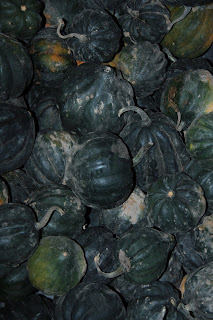



 A variety of pictures- Top, Chickens free-rangin'; a full view of our field!; our fall veggie patch featuring our frost protective row covers; our green bean patch that produced so much; watermelons all in a row.
A variety of pictures- Top, Chickens free-rangin'; a full view of our field!; our fall veggie patch featuring our frost protective row covers; our green bean patch that produced so much; watermelons all in a row.
Turtle Bend Farm is a sustainable vegetable farm in Polk County, Georgia. Adam and Mecca Lowe are growing vegetables on approximately 7 acres of family farmland using ecological methods without the use of synthetic fertilizers, pesticides, fungicides or herbicides. Our goal is to produce clean, healthy, fresh vegetables for our local communities while protecting and enhancing our local natural and social resources.























Harvest
Even though we got a late start in our first season, everything looks good and we are fairly close to our first big harvest. We are planning to attend our first markets next week, possibly on July 4th. The heirloom tomatoes look good and are tied to tobacco sticks we picked up while visiting family in North Carolina. It was a time consuming task so hopefully it will support the weight of the tomatoes. We will have to figure out a better system for next year, when we anticipate doing twice as many tomatoes. Our bell pepper plants are heavy with green peppers and some are starting to turn their beautiful shades of yellow and orange. We will likely bring some green bell’s to sell next week while we let most of them ripen on the plant. We will also have a good first crop of green beans, squash and zucchini. Our black-eyed peas are looking extraordinary with their dark green leaves and yellow flowers. We aren’t sure if we will have the time to actually shell the peas for our customers or if they will just have to do that on their own. We have considered investing in a pea sheller but we have heard that they can damage the delicate peas.
Planting
In anticipation for our fall season we ordered plenty of winter squash like butternut, pumpkins, and spaghetti so they can be ready in October. Winter squash are planted in the summer and stay on the vine till it dries in the fall. They are called “winter” squash because they will keep through most of the winter. We have also been keeping up with our successions of green beans so that we can have tender, young green beans for our customers throughout the entirety of their season. We have also recently planted a crop of sorghum sugar cane, which will hopefully provide a small bit of molasses and a good seed crop for next year’s larger sorghum patch. If we have any extra molasses we will pass that on to our customers this year, and next year we plan to have a larger quantity.









One issue that we have had the most trouble figuring out has been irrigation. We decided early on that we were going to irrigate from the creek using a gas-powered pump because there is no well closeby and no electricity run to the field (yet). We contacted our local NRCS office about applying for a cost-share for irrigation and to learn about how to set up our irrigation. We got good news and bad news. The good news is that they have engineers who can design a system for us since we qualify as "small-scale" producers, but that wouldn't be ready for several months. The bad news is that we can't get any cost share until we clear $1,000 of farm income, and even then, our application wouldn't go through until next year. So, we were on our own. After scouring the internet and coming up short on technical information, we finally figured it out ourselves with a little help from random people who sold different pieces of our irrigation system. We bought two 250 gallon tanks from a guy who listed them on craigslist. Then we went to Tractor Supply and bought a gas-powered water pump, hoses and other fixtures. We finally got a good farm boy who knew something about moving water and he was a big help. The last piece was the drip lines. Because we are going to run a low-pressure system, the drip lines are our best bet. We are lucky to have the Holt Family Farm Supply in nearby Euharlee, GA. Charles Holt is a dripworks distributor and he is ordering our drip lines and other fixtures. We hope to get this system going this weekend and I will post some pictures of that as well. Whew! Water is important! One thing we have realized in trying to figure out everything from straight fencelines to pumping water is that there IS a use for that math we learned in high school! If only we could remember it!
